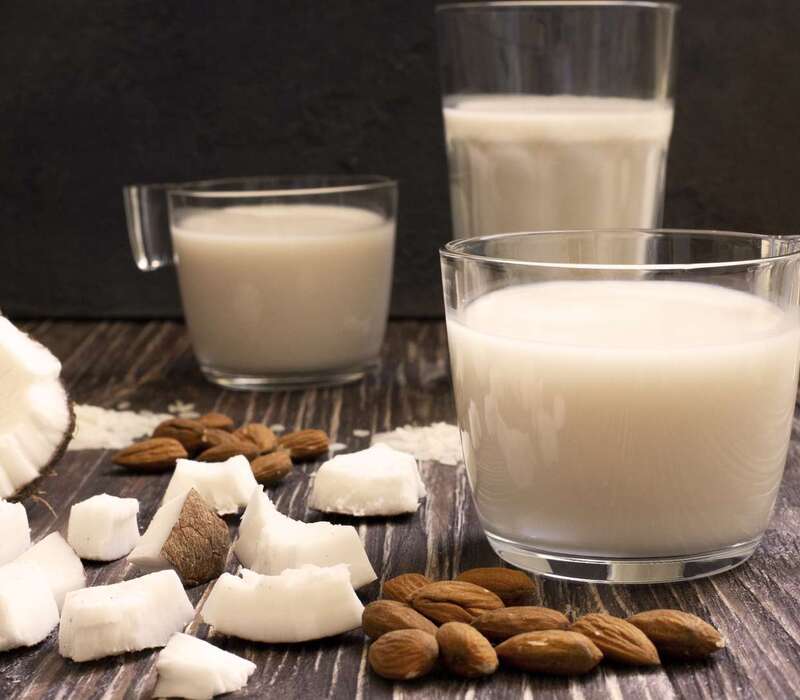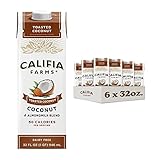When it comes to coconut milk vs almond milk, which is healthier? There are several varieties of coconut milk vs almond milk to choose from at the grocery store; you can choose from shelf-stable cartons or refrigerated cartons of both.
It’s important to note that coconut milk used as a drinkable dairy milk alternative is different from coconut milk used in cooking (especially in recipes like curry), which is canned and much higher in fat than liquid coconut milk. When it comes to milk, almond, and coconut milk are the most popular and accessible.
Even coffee shops like Starbucks and Dunkin’ Donuts have added these non-dairy nut milk to their menus for their customers. While the differences between coconut milk vs almond milk may seem obvious, there’s more to it than just the ingredients.
Knowing how they’re made, the nutrition facts, and the benefits of coconut milk vs almond milk can help you make a choice that best suits you and your diet before you add your milk to your shopping cart or cup of coffee.
Page Contents
Coconut Milk vs Almond Milk

If you’ve purchased plant-based milk on a recent grocery haul, you’re not alone. According to a Harris Poll conducted for the grocery service Instacart, the number of people who purchased plant-based milk rose.
The survey found that almond milk is the most popular choice, although coconut milk is the leading pick in the Pacific Northwest. Either way, both plant-based kinds of milk are winning over fans.
Just how do these dairy alternatives compare? Read on to learn about the nutritional differences between these two trendy kinds of milk.
Coconut milk and almond milk often have thickeners added to make them more creamy and less watery in texture, such as guar gum, xanthan gum, and carrageenan. These thickeners are gluten-free.
Because dairy-free milk alternatives are popular among vegans, they are often fortified with key nutrients that can be deficient in a vegan diet, such as calcium, vitamin D, and vitamin B12. I have also written an article on Do You Know The benefits of Coconut Milk Carbs?
Who Should Try Coconut Milk vs Almond Milk?
Almond milk, coconut milk, and other plant-based options are suitable for a variety of reasons.
If you’re lactose intolerant or are allergic to cow’s milk, these plant-derived alternatives make for good substitutes in cereal, oatmeal, smoothies, coffee, and baked goods without producing any troubling effects.
These kinds of milk can also help you reduce your consumption of animal foods, something many people are striving to do. The reality is that even dairy drinkers consume alternative milk sometimes.
Both coconut milk and almond milk are considered nut milk, so those with nut allergies are better off with something like soy milk, oat milk, or hemp milk. You can get more from this video.
Key Differences Between Coconut Milk vs Almond Milk
Fat Content
Coconut milk is slightly higher in fat than almond milk, with a typical total fat content of 4-5 grams per eight ounces compared to 2-3 grams in the same portion of almond milk.
If you choose canned coconut milk it will be much higher in fat, which will separate from the liquid in the can. This type of coconut milk isn’t usually meant for drinking but is best used in cooking.
The type of coconut milk we’re referencing in this article is ready-to-drink coconut milk, either shelf stable or refrigerated.
Type of Fat
Almonds are rich in unsaturated fat, which is why almond milk is lower in saturated fat than coconut milk. Coconuts consist primarily of saturated fat, making coconut milk higher in saturated fat than almond milk. You can read more about Coconut Milk Tea – Luxuriate in the Flavor of it.
Allergies
The Food and Drug Administration (FDA) lists coconuts as tree nuts, though many people with tree nut allergies can safely eat coconut. Therefore, coconut milk is more allergen-friendly than almond milk for those with tree nut allergies.
Both almond milk and coconut milk are dairy- and lactose-free, making them suitable for those with a cow’s milk allergy or lactose intolerance.
Coconut Milk vs Almond Milk Taste

Coconut milk usually tastes mildly like coconuts, while almond milk doesn’t tend to have as distinct of a flavor. Everyone has different taste preferences, so you’ll likely favor the taste of one over the other.
Neither unsweetened almond nor coconut milk tastes very sweet. If you choose sweetened and flavored versions, they will likely be more palatable, especially if you drink them plain. Sweetened versions can be high in added sugar, though.
Some brands offer unsweetened vanilla versions of almond and coconut milk, which give it a subtle vanilla flavor without added sugar. You can also find blends of coconut milk and almond milk.
Calories in Coconut Milk vs Almond Milk
Because it’s higher in fat than almond milk, coconut milk is slightly higher in calories compared to almond milk, but it’s not significant. Another on Starbucks Coconut Milk Nutrition Facts.
Cooking With Coconut Milk vs Almond Milk
You can use coconut milk and almond milk in cooking and baking, which can help make recipes suitable for those with dietary preferences and food allergies.
In most cases, you can substitute cow’s milk with coconut or almond milk in recipes, though the flavor and texture might be different than if you followed the recipe exactly. To avoid this, choose recipes that originally call for non-dairy milk like coconut milk and almond milk.
Some recipes call for canned coconut milk because it’s much higher in fat than liquid coconut milk. If you’re cooking Thai dishes like curry, you should most likely be using canned coconut milk and not liquid ready-to-drink coconut milk.
How to Use Coconut Milk vs Almond Milk?
Both coconut milk and almond milk can be used in ways you traditionally use cow’s milk, such as to lighten coffee, as an ingredient in baked goods, and mixed with cereal or oatmeal.
Coconut milk has a coconutty flavor, which may not pair well with certain recipes.
Unsweetened, plain versions of these milk substitutes also work well in savory recipes. But if a recipe specifies a type of milk, you may want to use that product for the best results.
Conclusion
Coconut Milk Versus Almond milk – Which one is your choice? Tell me about your preference in the comment section. I look forward to hearing your opinions.
Because of the comparative supplement piece and surface, almond milk can be subbed instead of coconut milk, excepting any sensitivities. Almond milk will yield an alternate flavor profile, so it probably won’t be best for dishes that depend on the coconut flavor given by coconut milk.
While picking unsweetened almond milk and coconut milk, almond milk is somewhat higher in sugars than coconut milk (3.4 grams per cup of almond milk and 2 grams for some coconut milk referring to the diagram above).
Almond milk is still extremely low in sugars with less than five grams for each cup, so it’s reasonable for low-carb consume fewer calories, including the keto diet.
Almond milk and coconut milk are both reasonable for smoothies; it’s an issue of your taste inclinations.







